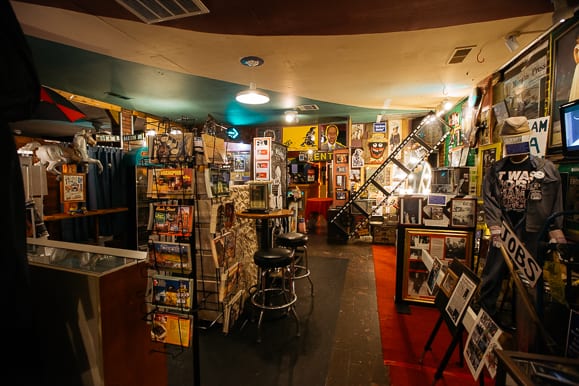This article originally appeared as part of High Ground’s “Larger than the Lorraine: Local Black history museums you haven’t heard of,” published May 2017. It is reprinted here with minor edits. References to years or times have been updated where applicable.
Located at 1289 and 1291 Madison Avenue, the House of Mtenzi museum and It’s My Time Entertainment Cafe’s colorful exteriors stand out from the nearby strip retail and gas stations along Madison Avenue near North Claybrook Street.
Hand-painted murals in right blues, reds and yellows read ‘It’s My Time’ and encourage customers to ‘Support the Arts’ and ‘book your event here!’
Inside, the museum seems almost cavernous. Every nook and cranny of the building is filled with artifacts of personal and historical significance. The word Mtenzi means artist in Swahili, and art is the connection between one family’s history and the greater narrative of the fight for civil rights.
Owner Stanley Campbell Sr. started It’s My Time roughly 20 years ago as a space for events and art shows. The adjacent House of Mtenzi is a newer addition. The eclectic museum, which is open Monday through Friday from 11 A.M. to 6 P.M. with a $5 admission, was created eight years ago and tells the history of Campbell’s family and their personal and sometimes historic imprint on Memphis.
The walls are lined with personal mementos such as pictures, records, letters, and men’s suits with descriptions for a self-guided tour explaining the significance of each item. Support from his family and memories shared by his mother helped shape the exhibits.
One of the many signs and messages on the walls of the museum is the “Nine Mustard Seeds of Faith,” meant to represent Campbell and his eight brothers and sisters.

It’s also an eclectic journey through Memphis’ eccentric history and Campbell’s own creativity.
A photo from 1977 of Michael Jackson atop the roof of Memphis’ Woolco Department Store stands next to an encased suit with a gold mask meant to represent the Runaway Man, a character of Campbell’s creation. Near that display is a replica of a Ku Klux Klan uniform.
The museum is a more than 2,000 square foot comprehensive visual of his family’s history and a personal angle to Memphis’ dominant civil rights narrative.
Family history bleeds into historical significance when Campbell talks about his mother, Thelma. Thelma’s family were sharecroppers, and she began picking cotton as a child in 1938. In 1966, she decided she was tired of cotton fields and wanted to start a new life. She moved with Campbell, who was born in Como, Miss., to Memphis.
Thelma was diagnosed with Alzheimer’s eight years ago. That’s when Campbell decided to open the museum.
“That’s why the museum is here,” Campbell said. “My mom was a major activist in the City of Memphis feeding the homeless, helping to campaign for (Harold) Ford Sr. in the 70s and 80s.”
“She was neighborhood president in South Memphis. That right there was a challenge,” he continued. “In the 70’s and especially in the 80’s when crack started hitting the scene, she ministered to the dope pusher, to the crackhead … she was just an all-around queen, I would say.”

One of the first exhibits in the House of Mtenzi is a replica of Thelma’s home in Mississippi accompanied with a recording of her singing.
“I taped her a year and a half ago. One thing I do know, my mom is a God-fearing woman. She may at this moment, forget who I am or my name, but she knows God and she knows gospel songs. It’s just rooted in her heart,” Campbell said.
“She would stop singing and say, Ok…so who are you? She would say that to me, but she would sing like that (referring to audio in the background of Thelma singing).”
Campbell said he’s currently training a successor that will hopefully help the museum continue to grow into a larger venue in the next 20 to 30 years.


